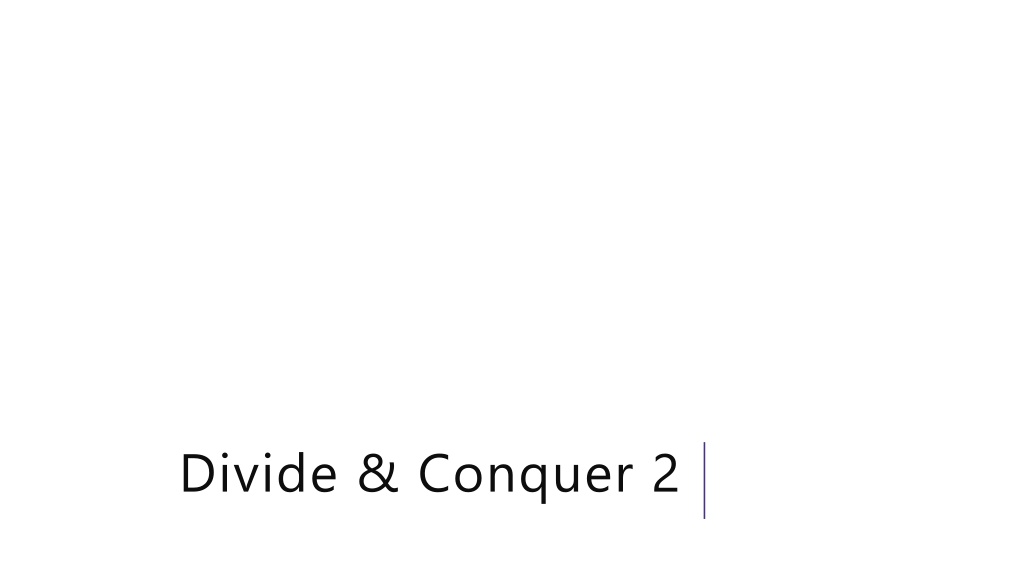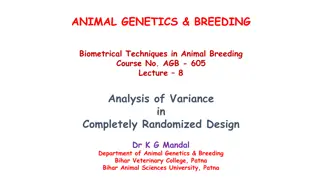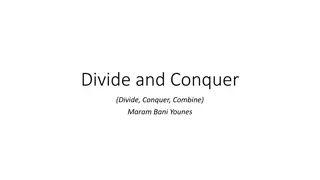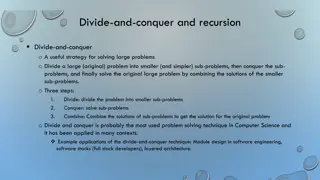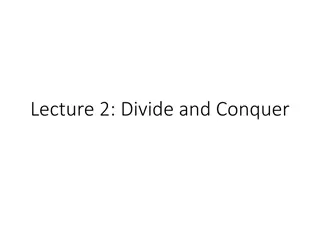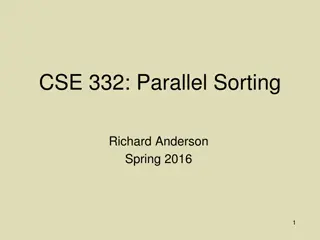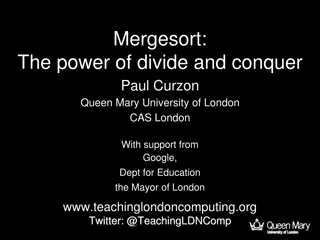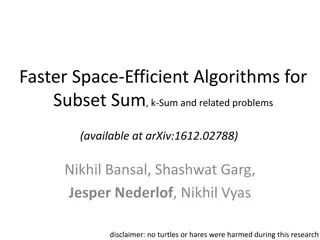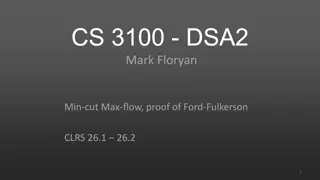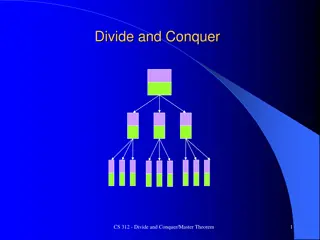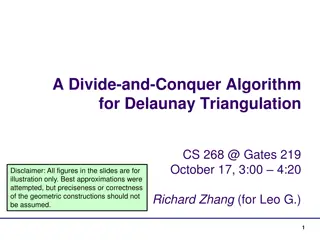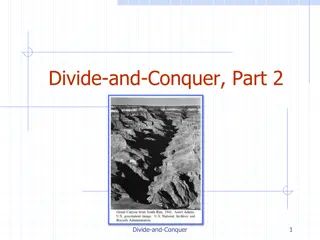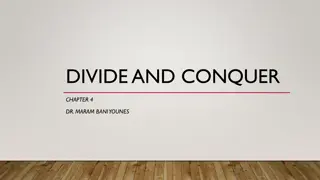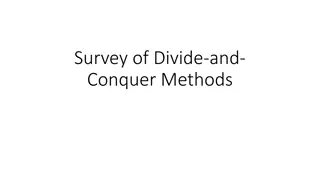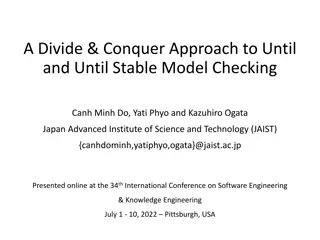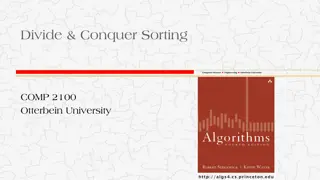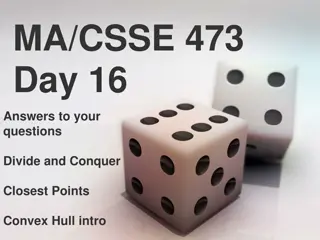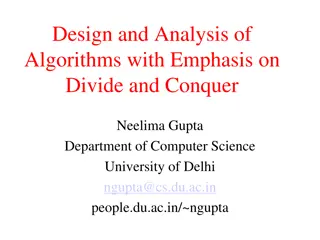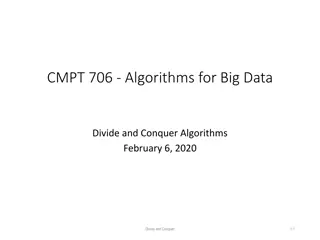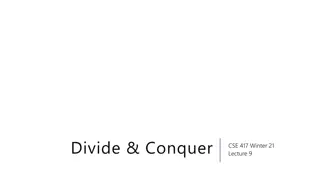Understanding Divide and Conquer Algorithm for Maximum Subarray Sum
Explore the concept of divide and conquer in solving the maximum contiguous subarray sum problem. Learn how to split the array, solve parts recursively, and combine answers efficiently. Discover the limitations of a brute force approach and delve into edge cases to optimize your algorithm. Conquer the challenge of finding the optimal subarray through efficient handling of left, right, and middle subarrays.
Download Presentation

Please find below an Image/Link to download the presentation.
The content on the website is provided AS IS for your information and personal use only. It may not be sold, licensed, or shared on other websites without obtaining consent from the author. Download presentation by click this link. If you encounter any issues during the download, it is possible that the publisher has removed the file from their server.
E N D
Presentation Transcript
Ken Yasuhara is here to collect your feedback for me. TAs and I will be in the waiting room (unable to hear anything) Ken is recording to his local computer (I won t have access to the recording). Asynchronous? You ll get a way for your feedback to be incorporated later this week.
Another divide and conquer Maximum subarray sum Given: an array of integers (positive and negative), find the indices that give the maximum contiguous subarray sum. 0 1 2 2 4 3 4 3 5 6 6 7 -3 -1 -10 -4 Sum: 8
Another divide and conquer Notice, greedy doesn t work! (at least not the first one you d think of) add if it increases the sum wouldn t let you add in 3 (because you d decide not to include -1). 0 1 2 2 4 3 4 3 5 6 6 7 -3 -1 -10 -4 Sum: 8
Edge Cases We ll allow for ? = ?. In that case, ?[?] is the sum. We ll also allow for ? < ?. In that case the sum is 0. This is the best option if and only if all the entries are negative. 0 1 2 3 4 5 6 7 -3 -2 -4 -1 -3 -10 -6 -4 Sum: 0
Maximum Subarray Sum Brute force: How many subarrays to check? (?2) How long does it take to check a subarray? If you keep track of partial sums, the overall algorithm can take (?2) time. (If you calculated from scratch every time it would take (?3) time) Can we do better?
Maximum Contiguous Subarray 1. Divide instance into subparts. 2. Solve the parts recursively. 3. Conquer by combining the answers 1. Split the array in half 2. Solve the parts recursively. 3. Just take the max?
Conquer If the optimal subarray: is only on the left handled by the first recursive call. is only on the right handled by the second recursive call. crosses the middle TODO Do we have to check all pairs ?,?? 0 1 2 2 4 3 4 3 5 6 6 7 -3 -1 -10 -4
Conquer 0 1 2 2 4 3 4 3 5 6 6 7 -3 -1 -10 -4 Subarrays that cross have to be handled Do we have to check all pairs ?,??
Crossing Subarrays Do we have to check all pairs ?,?? 0 1 2 2 4 3 4 3 5 6 6 7 -3 -1 -10 -4 ? 2 1 + ? ? 2 2 + + ? ? + ? ? 2+ ? ? 2+ 1 + ?[?] Sum is ? ?,? affect the sum. But they don t affect each other. Calculate them separately! separately!
Crossing Subarrays Do we have to check all pairs ?,?? 0 1 2 2 4 3 4 3 5 6 6 7 -3 -1 -10 -4 Best ?? Iterate with ? decreasing, find the maximum. ? = 1 has sum 5. Time to find ?? (?)
Crossing Subarrays Do we have to check all pairs ?,?? 0 1 2 2 4 3 4 3 5 6 6 7 -3 -1 -10 -4 Best ?? Iterate with ? increasing, find the maximum. j = 4 has sum 3. Time to find ?? (?)
Crossing Subarrays Do we have to check all pairs ?,?? 0 1 2 2 4 3 4 3 5 6 6 7 -3 -1 -10 -4 Best crossing array From the i you found to the ? you found. Time to find? (?) total.
Finishing the recursive call Overall: 0 1 2 2 4 3 4 3 5 6 6 7 -3 -1 -10 -4 Compare sums from recursive calls and ? ? + + ?[?], take max.
Running Time What does the conquer step do? Two separate (?) loops, then a constant time comparison. So ? 2 ? ? = 2? + ? if ? 2 1 otherwise Master Theorem says (?log?)
One More problem We want to calculate ??%? for a very big ?. What do you do? Na ve algorithm for-loop: multiply a running product by ? and modding by ? in each iteration. Na ve is computer-scientist-speak for first algorithm you d think of. Thinking of it doesn t doesn t mean you re na ve. It means you know your fundamentals. And no one told you the secret magic speedup trick. Time? ?(?)
A better plan What s about half of the work? ??/2%? is about half. DivConqExponentiation(int a, int b, int n) if(n==0) return 1 if(n==1) return a%b int k = divConqExponentiation(a,b,n/2) /*int div*/ if(n%2==1) return (k*k*a)%b return (k*k)%b
Running Time? ? 2+ 1 if ? 2 1 Which is (log?) time. ? ? = ? otherwise Much faster than ?(?). Fun Fact: RSA encryption (one of the schemes most used for internet security) needs exactly this sort of raise to a large power, mod b operation.
When to use Divide & Conquer Your problem has a structure that makes it easy to split up Usually in half, but not always You can split what you re looking for (subarrays, inversions, etc.) into just in one of the parts and split across parts The split ones can be studied faster than brute force.
Classic Applications There are a few really famous divide & conquer algorithms where the way to recurse is very clever very clever. The point of the next few examples is not tricks (they often don t generalize to new problems). It s partially to show you that sometimes being really clever gives you a really big improvement And partially because these are standard in algorithms classes, so you should at least have heard of these algorithms. not to teach you really useful
Classic Application Suppose you need to multiply really numbers. Much bigger than ints Split the n bit numbers in half Think of them as written in base 2?/2 really big x_1 x_0 y_1 y_0 What would the normal multiplication algorithm do? x_1y_0 x_0y_0 4 multiplications, i.e. 4 recursive calls. x_1y_1 x_0y_1
Classic Application x_1 x_0 If n bits is too many to multiply in one step (e.g. it s more than one byte, or whatever your processor does in one cycle) Recurse! Running time? y_1 y_0 ? 2+ ? ? if ? is large ? 1 if ? fits in one byte x_1y_0 x_0y_0 ? ? = 4? x_1y_1 x_0y_1 Why ? ? ? It takes ?(?) time to add up ?(?) bit numbers they have ?(?) bytes! (Why have you never seen this before? We assumed our numbers were ints, where the number of bytes is a constant) Overall running time is ?2
Clever Trick We need to find x_1y_0 + x_0y_1. Does that look familiar? It s the middle to terms when you FOIL Define ? = ?0+ ?1,? = (?0+ ?1) ? ? = ?0?0+ ?1?0+ ?0?1+ ?1?1 So ?? ?0?0 ?1?1=?1?0+ ?0?1 What do we need to find the overall multiplication? ? 2+ ?1?1 2? ?0?0+ (?? ?0?0 ?1?1) 2 ?0?0,?1?1 and ?? are enough to calculate the overall answer! Only 3 multiplies of n/2 bits!
Running Time ? 2+ ? ? if ? is large ? 1 if ? fits in one byte ? ? = 3? log23 > 1, So running time is ? ?log23 Or about ? ?1.585
Strassens Algorithm Apply that save a multiplication idea to multiplying matrices, and you can also get a speedup. Called Strassen s Algorithm Instead of ? ?3 time, can get down to ? ?log27 ? ?2.81. Lots of more clever ideas have gotten matrix multiplication even faster theoretically theoretically. In practice, the constant factors are too high.
